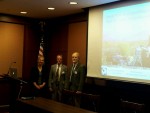On June 10, 2014, the Long Term Ecological Research (LTER) Network hosted a Congressional Briefing in the Capitol Visitor Center, Washington, DC, focused on the theme, “Long Term Ecological Research: regional data for large scale environmental issues.” The briefing was organized by Robert Gropp and Julie Palakovich Carr of the American Institute of Biological Sciences (AIBS), with excellent assistance from staff in Senator Ben Cardin’s (D-Md) office, particularly, Joel Cohen and Gray Maxwell. The LTER speakers included Emma Rosi-Marshall (BES), Phil Robertson (KBS), and Scott Collins (SEV and chair of the LTER Network).
The session opened with brief remarks by Gropp, followed by a short overview by Collins of the LTER Network and the value of long-term research for understanding and managing ecosystem services. The first LTER talk by Rosi-Marshall was titled, “The sanitary to the sustainable city: Long-term ecological research of the Baltimore urban ecosystem.” It described efforts to develop fundamental ecological knowledge that will help local decision makers understand and evaluate processes that promote sustainability in this urban ecosystem.
Next was Robertson, who discussed, “Farming for ecosystem services: a new sustainability paradigm for production agriculture.” Robertson summarized the impact of farming practices on climate as an example of a service that could be provided, building on long-term biogeochemical research at KBS to devise methods to reduce greenhouse gases from agricultural production while sustaining yields through market based carbon trading and offsets. The final presentation, “Global change impacts on Chihuahuan Desert ecosystems,” by Collins focused on two impacts of global environmental change: the consequences of shrub encroachment, a topic well off the radar screen inside the Beltway, and the impacts of catastrophic wildfires on water quality in the middle Rio Grande.
The three LTER presentations covered long-term research in systems ranging from urban to wildlands, but a common theme throughout was the value of integrated, interdisciplinary, long-term research for both understanding ecosystem structure and function, and for managing ecosystem services.
Over 30 people, including notables from the National Science Foundation (NSF), a number of congressional offices, and several Non-Governmental Organizations, attended the briefing, which was a great success and a wonderful opportunity to highlight LTER, NSF, and the value of long-term research.

 Enlarge this image
Enlarge this image